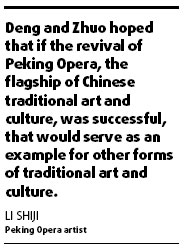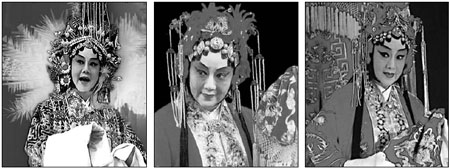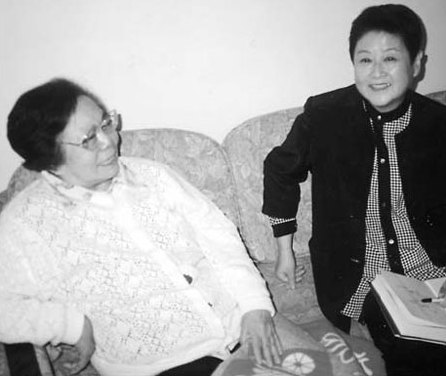Singing praises to a friend
|
Li Shiji has played a lead role in reviving the traditional Peking Opera after the "cultural revolution". File photos |
Li Shiji, 76, has been looking for a store in Beijing dealing in specialties from Southwest China's Yunnan province. She finally finds one and on entering, asks for just one thing - Xuanwei hams.
Not that hams are Li's favorite. But she feels there is no better way to commemorate her revered and beloved friend Zhuo Lin, wife of China's late leader Deng Xiaoping, who died on July 29. Her memorial service takes place today at Beijing's Babaoshan Funeral.
Memories of their friendship, that goes back to 1980 and is not known widely, have been flooding back giving her sleepless nights. But diabetes has so wrecked her eyesight that she is not able to see their old photographs clearly, despite the use of a magnifying glass.
|
The friendship between Zhuo Lin (left), wife of China's late leader Deng Xiaoping, and Peking Opera artist Li Shiji lasted for about three decades. Courtesy of Li Shiji |
That's when she decided to look for Xuanwei ham, a specialty from Zhuo's hometown made internationally famous by her entrepreneur father Pu Zaiting.
"To me, Zhuo is a revered elder, a dear friend and a strong supporter of my career and life," says Li, one of the best-known disciples of Cheng Yanqiu, founder of the Cheng school of Peking Opera.
"It is a long story, but as I reflect on it, it starts to dawn on me that we all owe much to Zhuo for her constant efforts to revive traditional Chinese art and culture, not just Peking Opera," recalls Li, wearing dark glasses to hide her red eyes after spending two sleepless nights.
Between 1980 and 1994, Zhuo would visit Li once a week for discussions on Peking Opera and its revival after the "cultural revolution" (1966-76).
"Whatever I have achieved in Peking Opera can't be mentioned without [also mentioning] Zhuo's encouragement and support," says Li.
Li is regarded as a controversial reformer of Peking Opera. Since the 1980s, she has been keen on re-introducing the Cheng school in a way that is more appealing to the younger generation, and this has attracted much criticism from conservatives. But despite this, many claim to have taken to Peking Opera only because of her performances.
She shot to nationwide fame in 1979 when she became the first to bring traditional Peking Opera repertoires back on stage soon after the "cultural revolution", when all private and public performances of such traditional repertoires were banned.
Li recalls the number of times Huang Zhen, then Minister of Culture, summoned her to his office to encourage her to make the "ice-breaking move".
"He would say, 'some old comrades' would like to see you take a lead'," says Li.
It was not until a year later, when Zhuo showed up at Li's place, that Li and her late husband - Tang Zaixin, a renowned Peking Opera musician - realized that the minister was in fact referring to Deng and Zhuo when he said "some old comrades".
"I didn't recognize her since I hadn't seen her before in person," says Li, recalling Zhuo's first visit. "I was particularly curious that she carried with her a worn cushion and a ragged blanket - which had probably been used by several of her grandchildren - for the visit.

"It was only when she sat down, putting the cushion behind her and covering her legs with the blanket that I realized that she had come for a long conversation," says Li.
The visits became a weekly routine and lasted till 1994 when Deng came down with Parkinson's and Zhuo could not tear herself away.
Zhuo spent most of the time, during her visits, listening to Li and her husband describe their difficulties and achievements in reviving the Cheng school of Peking Opera.
Li and Tang would always record their performances for Zhuo to take back home. And at the next visit, Zhuo would offer her comments and suggestions "modestly". "She would never say 'you should', rather she would always say "you might try'," says Li.
Despite strong opposition from the conservatives, Li says her efforts to reform Peking Opera went smoothly, but this would have been impossible without Deng and Zhuo's support.
"Personally I am very grateful (for Zhuo's support), but I don't think she was helping me only out of personal interest," says Li.
In the early 1980s, keeping traditional Chinese art and culture alive was imperative owing both to the influence of the "cultural revolution" and the opening-up policy, explains Li.
"Deng and Zhuo hoped that if the revival of Peking Opera, the flagship of Chinese traditional art and culture, was successful, that would serve as an example for other forms of traditional art and culture," says Li.
Through the years, Li says, Zhuo always maintained such a low-key presence that it was not until years later that her neighbors started to take notice.
"She was a doer, determined and optimistic in times of ups and downs," says Li.
She recalls Zhuo recounting the darkest period of her life when Deng and she were in exile in East China's Jiangxi province and they had to also take care of their eldest son, disabled from a fall.
"She told the story like it was a normal part of life," says Li.
Zhuo became a role model for Li, who experienced the painful loss of her only son in 2001. Her husband Tang couldn't take this and died four years later, leaving her alone to take care of two granddaughters, now 9 and 6.
"I didn't call her much [after the death of my son] because I did not want her to worry," says Li.
"But deep in my heart, she has always been with me through all these difficult years in my life."
(China Daily 08/10/2009 page8)
















